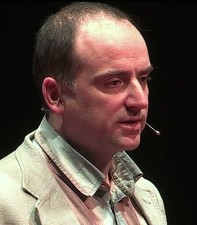The simple idea behind Smarter Cities: take better-informed, more forward-looking decisions
July 11, 2012 6 Comments

(Photo by Tanakawho)
I’m sometimes staggered by the sheer breadth of topics that we concern ourselves with in working to make cities Smarter. We encompass technology, social systems, the individual motivation of citizens, financial models, and the really big challenges of demographics and sustainability in our thinking.
I’m also struck by the level of sophistication of some of that debate. This week, I finally read the great paper by Geoffrey West and colleagues on urban scaling laws, “Growth, innovation, scaling and the pace of life in cities“. The paper applies to cities techniques that I recall from my Doctoral studies in the Physics and Engineering of Superconducting Devices for studying the emergent properties of self-organising complex systems. (Translate that to “understanding the outcomes of the interactions between the 100,000s or millions of human beings with free will who inhabit cities” and I hope you can see the similarity).
The paper is a less intimidating read than it might sound, and draws fascinating conclusions about the relationship between the size of city populations; their ability to create wealth through innovation; sustainability; and what many of us experience as the increasing speed of modern life. It’s well worth reading, as are David Roberts’ recent thoughts on the same subject on the Birmingham Science City blog.
(IBM’s Watson computer challenges human opponents in the US TV quiz show Jeopardy)
“Intelligent” refers to our capability to make sense of the ever increasing volume of data made available by instrumented, interconnected systems. Computers can now process data to the extent that they can compete successfully against human beings in general knowledge TV game shows; predict the occurrence of crime; and help healthcare professionals make accurate diagnoses based on research literature they’ve never read. Throughout my life I’ve read a lot of science fiction that has predicted a lot of amazing things; but none of it foresaw anything as impressive as these achievements.
(The city operations centre in Rio de Janeiro provides the city’s management team with incredibly rich information on which to base decisions.)
A really exciting possibility for the future lies in the ability of local currencies and trading systems to enable consumers and citizens to take such choices more frequently throughout their everyday lives. Such systems can incorporate regional social and environmental impact in the apparent cost of goods and services. Whilst today that ability is limited to goods and services created within the scope of the trading system, in future the Open Data movement will increasingly make the social and environmental footprint of all goods and services transparent such that local trading schemes can incorporate them. For my money, that’s a truly exciting prospect for the future.

Pingback: Can Birmingham break Geoffrey West’s laws of urban scaling? « Birmingham Science City
Pingback: Can cities break Geoffrey West’s laws of urban scaling? « The Urban Technologist
Pingback: Five roads to a Smarter City « The Urban Technologist
Pingback: Four avatars of the metropolis: technologies that will change our cities « The Urban Technologist
Pingback: Four avatars of the metropolis: technologies that will change our cities « Birmingham Science City
Pingback: Ten ways to pay for a Smarter City (part one) « The Urban Technologist